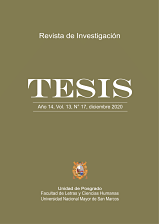La complejidad de la cognición humana: creer
DOI:
https://doi.org/10.15381/tesis.v13i17.19615Keywords:
Belief, Cognition, Philosophy of mind, Consciousness, LinguisticsAbstract
The following work attempts to broaden the perspective regarding beliefs considering that traditionally only beliefs of the conscious and linguistic type have been considered. In other words, it has been assumed that human cognition only creates beliefs from our ability to produce language. Contrary to this, the article suggests that cognition implies a spectrum of beliefs that also encompasses those that are neither linguistic nor conscious, and that emotions are beliefs as propositional survival programs. In order to accomplish this, theories of the philosophy of the mind, contemporary psychoanalysis, Buddhist psychology and neuroscience are treated. Taking all in consideration, we can assure that the amount of beliefs we have is much wider than those of which we are linguistically aware.
Downloads
Published
Issue
Section
License
Copyright (c) 2020 Daniel Alejandro Castro Figueroa

This work is licensed under a Creative Commons Attribution 4.0 International License.
THE AUTHORS RETAIN THEIR RIGHTS:
(a) The authors retain their trademark and patent rights, and also on any process or procedure described in the article.
(b) The authors retain the right to share, copy, distribute, execute and publicly communicate the article published in Tesis (Lima) (in example, depositing the article in an institutional repository or publish it in a book), with recognition of its initial publication in the Tesis (Lima).
(c) The authors retain the right to make a later publication of their work, to use the article or any part of it (for example: a compilation of their works, notes for conferences, thesis, or for a book), provided that they indicate the source of publication (authors of the work, magazine, volume, number and date).






